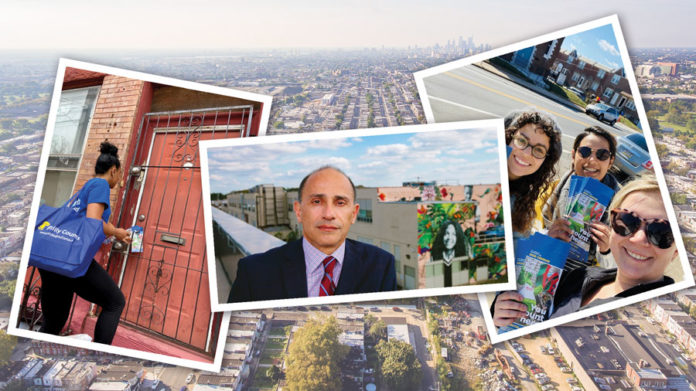
Latino community before the Pennsylvania Senate State Government Committee’s public hearing on congressional reapportionment. Reverend Cortes, who has served as the Executive Vice President and Chief of Staff of Esperanza Inc for over 25 years, appeared before the Committee alongside six other in-person testifiers. Four additional testimonies were submitted in writing to the Committee.
Redistricting, also known as reapportionment, is a process that takes place every ten years to redraw state political district lines – thus determining what groups of people vote together for their political representation in each state. The results of the US Census help inform the redistricting process, by providing demographic and other information about who is living within the state, and how people are distributed into different geographies and communities.
After opening remarks by Senator David Argall (R-29th) and Senator Sharif Street (D-3rd), four of the seven in-person testifiers, including the Reverend Cortes, focused their remarks on accounting for “communities of interest” in the redistricting process. The term “communities of interest” describes groups of people who share common priorities and characteristics, such as ethnic, cultural, economic, trade area, geographic, and demographic factors, among others. The definition for these groups is set at the state level, and different states define communities of interest differently; currently, 17 states have some legal provision for communities of interest in their redistricting processes, captured in their state Constitutions, statutes, courts, or redistricting Commission guidelines.
Although Pennsylvania does not have any provisions for communities of interest in its Constitution or legislation, the concept is widely recognized by the courts, the legislature, and the Pennsylvania Redistricting Reform Commission. In 2018, when the Pennsylvania Supreme Court ruled the legislative districts established by the state in 2011 were illegal because they unlawfully broke groups apart and diluted the votes of certain communities and their residents to advance partisan political agendas, the idea of communities of interest was discussed at length – both in the testimony to the court and the final majority opinion. The court reminded the legislature that districts must uphold “neutral criteria of compactness, contiguity, minimization of the division of political subdivisions, and maintenance of population equality among congressional districts.” It was ruled that these criteria were not upheld in Pennsylvania. Witnesses in the case stated, and the court agreed, the state districts “give precedence to political considerations over considerations of communities of interest and disadvantages Democratic voters, as compared to Republican voters. This is a gerrymandered map.”
Ten years after that redistricting process, and three years after the historic court ruling, Reverend Cortes testified alongside other advocates to ensure that the upcoming redistricting process is fair, transparent, and legal. In the words of Reverend Cortes’s testimony, Latinos in North Philadelphia “are a community that shares and has a unique cultural background, primarily focused on the common experiences of descendants, migrants, and immigrants of the Caribbean (Puerto Rico, the Dominican Republic, Cuba). That reality continues to expand as the countries south of Texas add themselves to our community and we find that our common interest is more alike than dissimilar, providing ample room for common cause and the adoption of common agendas for our community betterment. As this body considers the question of redistricting, we are of the opinion that to disregard this history and geographic continuity would hurt the community’s capacity for appropriate representation. Currently, Latinos represent 26% of the residents of the 2nd district, offering the ability to have an equitable voice in discussing the concerns of the Latino district constituents. To splinter that constituent group would dissipate its ability to coalesce around common cause to affect its interests and address our needs as a Latino community.” Reverend Cortes went on to identify the areas of commonality for North Philadelphia’s Latinos, in education, health, and healthcare access, economics and workforce issues, and other areas. His testimony urged the Pennsylvania legislature not to divide the Latinos of North Philadelphia when district lines are redrawn for the next decade. . His full testimony can be found here:
http://44.218.246.32/wp-content/uploads/2021/08/Danny-Cortes_Testimony-8.4.2021-Redistricting-1.pdf






